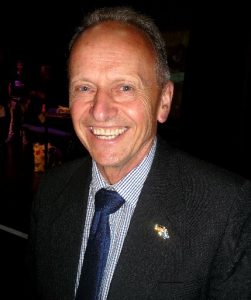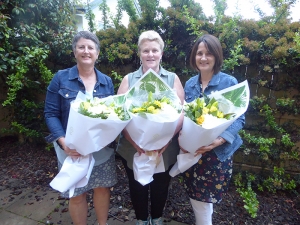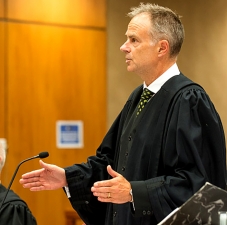Search

 Ken Pow. Photo supplied.He’s a “legend” and has been an advocate for the German language at Ashburton College for close to four decades, but Ken Pow is saying “auf wiedersehen” to teaching and heading for retirement.
Ken Pow. Photo supplied.He’s a “legend” and has been an advocate for the German language at Ashburton College for close to four decades, but Ken Pow is saying “auf wiedersehen” to teaching and heading for retirement.
He has taught German at Ashburton College for 38 years.
His love and enthusiasm of the German language and its culture has been shared with hundreds of students over that time.
In more recent years Mr Pow has helped the college become part of the PASCH partner schools network, which offers study and travel opportunities to students. He has also established close ties and a good relationship with the Goethe Institut New Zealand.
Speaking during a recent visit to Ashburton College by German Embassy deputy head of mission Dr Timo Bauer-Savage, Goethe Insitut New Zealand language department deputy director Judith Geare called Mr Pow a “legend among German teachers in New Zealand”.
Her long time colleague had contributed hugely to the teaching of the German language and she wished him well in retirement, she said.
Dr Bauer-Savage said he had heard about Mr Pow’s reputation and love of all things German.
“To hear his students speak so highly of him here today is a tribute to the man and shows the respect he has and the great work he has done promoting the German language.”
Ken Pow will also be missed at Ashburton College for his love and support of the game of chess. Retirement will allow him more time to indulge that hobby.
© The Ashburton Courier - 13 December 2018
 Mid Canterbury Netball handed out service awards to three long-serving volunteers at their recent AGM (from left) Kaye Kennedy, Leonie Donald and Claire Corbett. Photo supplied.Three long-serving members of the Mid Canterbury Netball community have been officially recognised for their years of work.
Mid Canterbury Netball handed out service awards to three long-serving volunteers at their recent AGM (from left) Kaye Kennedy, Leonie Donald and Claire Corbett. Photo supplied.Three long-serving members of the Mid Canterbury Netball community have been officially recognised for their years of work.
Claire Corbett, Kaye Kennedy and Leonie Donald were all presented with service awards at the Mid Canterbury Netball AGM recently.
Corbett has been involved in netball in Mid Canterbury for the past 19 years and has helped in all areas of the sport. She began umpiring in 1999, was selected in the Mid Canterbury umpire development squad in 2002 and 2003 and coached theory for many years as well as being a regional umpire trainer.
She always kept herself up to date, attending New Zealand umpire seminars, centre tester training and regional umpire training, and was a member of the regional sponsorship panel and an accredited umpire coach and assessor at New Zealand level.
In 2003 and 2004 Corbett led rules sessions every Saturday during the season for umpires, coaches and players wanting to better understand the rules, and she umpired representative fixtures and Mid Canterbury Netball competition games.
She has served on many committees and was always a valued member of them all.
Kennedy has also had a long involvement in all areas of the game after passing her local level one umpire award in 1999 and going to on pass her regional exam and New Zealand qualifying exam in 2003.
In 2004 Kennedy was named in the New Zealand umpire development squad and in 2005 she was appointed to the New Zealand Age Group Champs, and was selected to the New Zealand Umpire Development Squad from there. She was also appointed to the New Zealand Scotwood Trust Champs in Dunedin that same year.
She was on the centre tester panel for seven years, also an umpire squad coach, and tutored umpires for their theory exams for 10 years, and for three years was an accredited umpire coach and assessor at New Zealand level.
Kennedy was also on the Borough School Sports committee and had been on the Ashburton College Netball Club committee for the past two years, coaching teams from both schools including the College A side this season.
She has also been a Mid Canterbury selector of the U17 representative team.
Donald’s involvement in Mid Canterbury netball spanned the past 20 years, and she’d been a part of the Methven Netball Club for the past 23 years.
Still a member of the Methven Netball Club, Donald has held many posts within the club over the years and coached numerous Methven club teams, as well as umpiring at Methven player development camps and assisting with club umpiring sessions.
She became a local level 3 umpire in 1999 and the following year passed her Canterbury regional award and completed New Zealand Theory part A in 2001.
She had umpired competition and representative games in Mid Canterbury for the past 17 years and has also umpired at the South Island Secondary Schools’ Tournament.
Donald has assisted with New Zealand test banks of questions sessions, was an umpire examiner at local level, appointed umpires to representative fixtures and helped at junior umpire sessions.
She has umpired Mid Canterbury local competitions for the past 18 years and umpired representative fixtures, as well as being a bench official for the last three years and serving on the umpire committee for 20 years.
© The Ashburton Guardian - 13 December 2018
 James Rapley hard at work. Photo supplied.High-profile Christchurch lawyer and newly-appointed Queen’s Counsel James Rapley says he was lucky to grow up in Ashburton. Guardian reporter Linda Clarke caught up with him this week off the back of a big week where he was appointed to the Queen’s Counsel.
James Rapley hard at work. Photo supplied.High-profile Christchurch lawyer and newly-appointed Queen’s Counsel James Rapley says he was lucky to grow up in Ashburton. Guardian reporter Linda Clarke caught up with him this week off the back of a big week where he was appointed to the Queen’s Counsel.
Christchurch lawyer James Rapley didn’t need a map of the crime scene when he defended a young Ashburton man charged with murdering his brother by stabbing him.
The McDonald Street house that was the scene of a violent confrontation was just around the corner from where Rapley grew up.
Times were different back then.
He says he was lucky to grow up in a normal, hard-working, middle-class family where education was encouraged.
Rapley, who grew up in Porter Street, went on to develop a love for history and became a prominent lawyer.
He was this week appointed a Queen’s Counsel, status reserved for barristers who excel in their profession.
He went to Hampstead School, Ashburton Intermediate and on to Ashburton College from 1980-84.
In his final year of secondary school, he went on an American Field Scholarship (AFS) and spent 12 months in America.
“Back then, there was no McDonald’s, and no internet so it was a big thing.
“I loved it.”
He came back to Ashburton, worked for six months at RX Plastics to save up some money, then headed to the University of Canterbury.
Naughty
“I loved my time at Ashburton College. It was a very formative time for me. It was a great school.”
He has fond memories of the college, even if his third form (Year 9) reports suggested the young Rapley was a bit naughty in class, “distracting and could do better”, teachers told parents Jackie and Richard.
History teacher Brian Edmondston was able to turn that around by realising he had a love of history and needed some direction.
“Thanks to him, and mum and dad, who said the power of learning and the need for higher education could be channelled in a subject I love … the Roman Empire and the Middle East.
“And so I made up my mind to buck my ideas up a bit and ensure I started to do better and achieve, which I did and made my way to uni … and once I was there, a whole new world opened up.
“I never intended to be a lawyer. I was going to be a doctor and I was very lucky. We came from a very normal, hardworking middle-class family. Mum and dad always encouraged us to try and do well and emphasised the benefit of school and education.
“So a doctor was where I was going to go, but I hadn’t done physics and I needed that for first year health sciences.”
So Rapley followed his high school love of history and enrolled at UC.
“I took history and political science and law as a filler. It turned out I loved law and enjoyed the history that comes with law, and really enjoyed the debating and arguing that is part of the discipline.”
The rest is, well, history.
Rapley graduated from Canterbury with a law degree in 1989 and was admitted to the bar the following year. He worked for several Auckland law firms and got his masters before joining the Serious Fraud Office as a prosecutor.
He worked overseas and then returned to Christchurch, where he now practises from Bridgeside chambers specialising in criminal litigation.
He is a member of both the New Zealand Law Society’s Criminal Law Committee and Lawyers’ Standards Committee.
Students
When he’s not working for clients, Rapley teaches law at the University of Canterbury. For 15 years, he has been teaching students courtroom skills, like how to cross-examine and how to open and close a case at trial.
There is stiff competition for jobs among law graduates, he says. He advises them to develop skills that help them stand out from the crowd, be it a double degree, high marks, charity work, or sporting achievement.
“I tell them just because you have an LLB it does not make you special. Everyone who is applying for that job has one of those. What else have you got?”
He also tells them to have a plan. If they want to work in the country, think resource management; in the city, then commercial law.
And have more than one law string to your bow.
Criminal law is the most exciting arm of the profession though.
But it is a tough road and can be all-consuming. Rapley has represented murderers, rapists and other serious offenders.
“You can walk in some pretty dark shadows,” he says.
Rapley was appointed amicus curia (friend of the court) to assist Ashburton Winz killer Russell John Tully, who refused to co-operate with his appointed defence counsel.
He also represented Bronson Kelekolio who admitted the 2012 murder of Ashburton mother Sino Solomona, and Jayden Alexander, who was found guilty of killing his brother with a single stab to the chest at the McDonald Street house in 2016.
He was also defence counsel for Kooly Te Tomo, found guilty of the manslaughter of Arran Gairns, whose body was found in a ditch off West Street in 2014 after a drug deal went bad. Rapley is appealing the conviction and a decision is expected by the Court of Appeal soon.
“It is rewarding, but some cases are really upsetting and distressing.”
He is sometimes asked how he can defend people others see as unpleasant and despicable.
“It is part of the obligation as a barrister.
“There is a rule, the cab rank rule, that you have to accept a brief if it is in your area. It is a historical rule and one of the foundations of our justice system.”
Rapley works with his wife Tuula; they share the dark moments and make sure they have healthy interests, including their children, outside the profession to keep them sane.
“Most of my clients though are just normal people who have got themselves into bother.
“People who get into situations and need some help.
“They might have committed a crime, or not, but all of a sudden are facing the judicial system where they are on trial, with serious consequences.
“That is where it can be really rewarding. You help them through it and get a great result if it turns out there are some problems with the evidence or witnesses are lying or not involved at all.”
Noble profession
Rapley says the legal profession is still a noble profession.
“We are very fortunate in New Zealand.
“We are a small country and people know each other. We are a nation of people who care and do the right thing in most instances, and the legal profession is the same.”
He says one of the biggest challenges facing the profession is the fact that many people can’t obtain the services of a lawyer for their court case … these “working poor” who don’t quality for legal aid end up representing themselves.
“It an issue of real concern to the New Zealand Bar Association.”
He says he knows of many barristers and advocates doing pro bono work or working for reduced rates.
Maori
Rapley is also concerned about the over-representation of Maori in the justice system. Maori make up 15 per cent of the population, but 50 per cent of the prison population.
He believes more lawyers should call for cultural reports that have been legally allowed since the 1980s but rarely used.
He called for the specialist report when representing Alexander. It was powerful and helped the sentencing judge understand how influences and events in the young man’s life had shaped his destiny.
Alexander, 25 at the time, had no connection to his Maori identity after being placed in foster care with Pakeha families since the age of 18 months. Filling the cultural void would be life-changing.
“There is so much more that can be obtained than a report provided by a probation officer.”
But the questions going forward around cultural reports will be who pays and who is qualified to write them.
The responsibilities of his new Queen’s Counsel title are beginning to sink in. “I am proud. It is a massive professional accolade of my abilities, skills and standing as an advocate and barrister.”
The appointment process is intense, with input from the Attorney General, the chief justice of the Supreme Court, the solicitor general, president of the Court of Appeal, the chief high court judge and president of the New Zealand Law Society and Bar Association.
While it recognises Rapley’s excellence, it also carries with it a special responsibility for leadership and giving back to the profession, especially helping younger lawyers.
“It is a real privilege and very special honour.”
By Linda Clarke © The Ashburton Guardian - 1 December 2018


